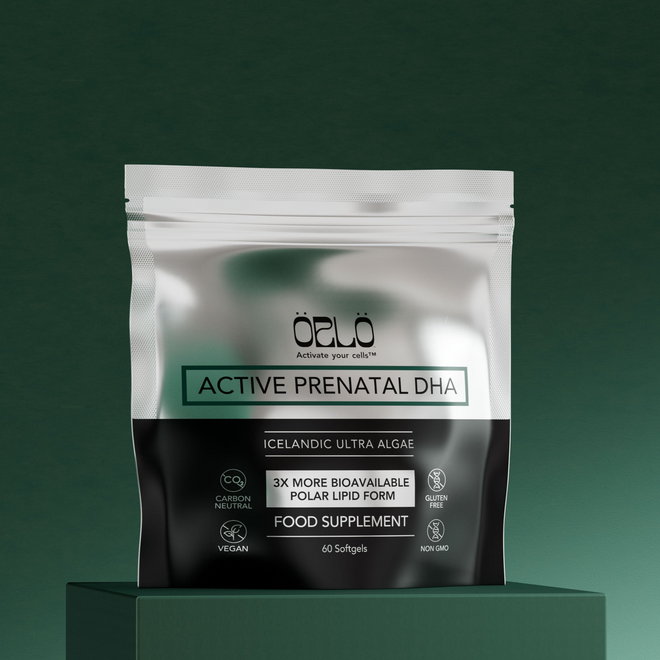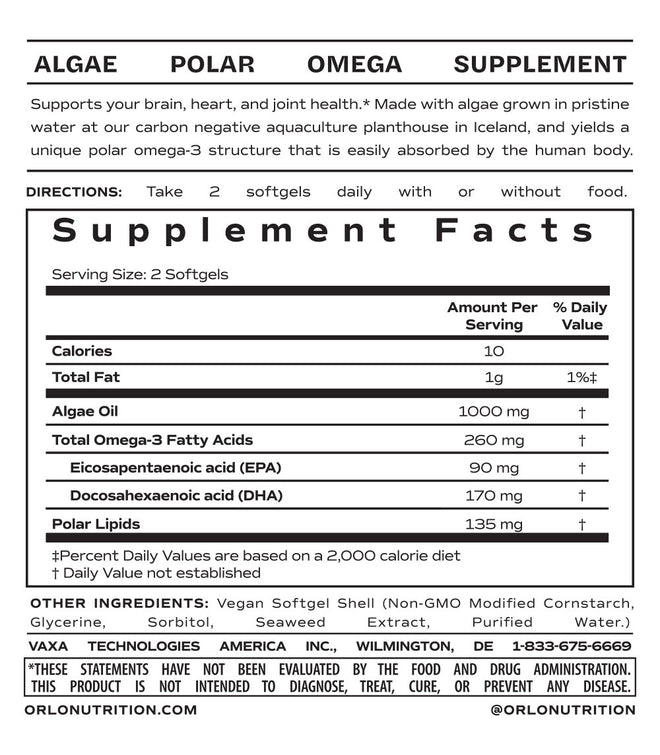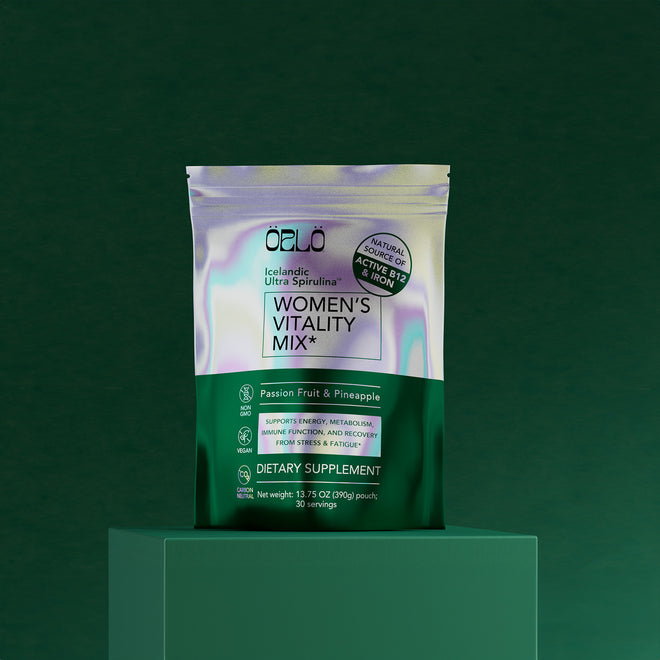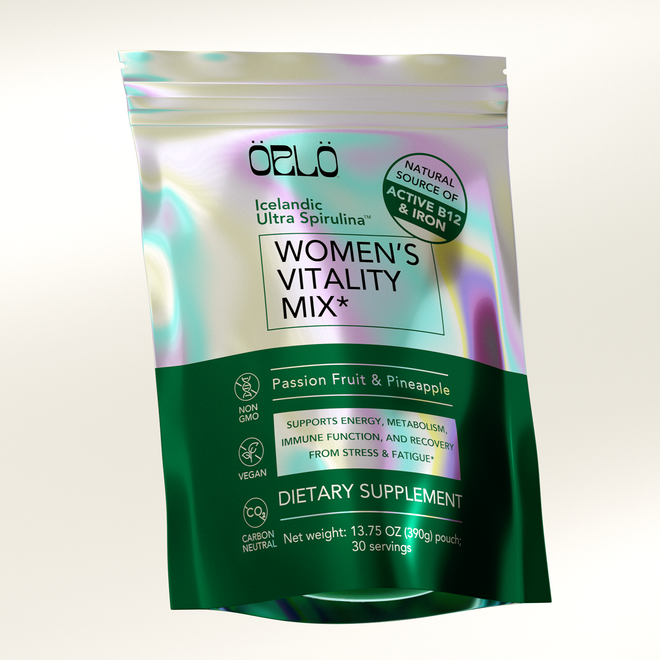Free shipping on purchases over $69
Gut Instinct: The Crucial Link Between Men’s Gut Health, Overall Wellness, and Nutrition
Written by: Marci Clow, MS, RDN
Men are infamous for being less likely than women to regularly visit their healthcare providers. Yet, there is a clear need for interventions to address common gut health and digestive concerns that may affect their overall wellness. The average US adult male consumes a dietary pattern inadequate in fruits, vegetables, and whole grains, all foods that can significantly affect gut health. A 2023 survey found that individuals with digestive issues, like gas and bloating, learn to live with these uncomfortable symptoms versus seeking medical attention. This article will explore the link between gut health and nutrition, the impact on overall wellness, and the significance of men’s health.

The Gut Microbiome: A Complex Ecosystem
The microbiome is everywhere, literally. The trillions of microorganisms that live in our hair, on our skin, in our
mouths, in the sinuses, in our guts, and in the urogenital area are collectively known as the human microbiome. Advances in research have catapulted discussions of the gut microbiome to the mainstream; however, most Americans are not well informed about the crucial impact of gut health on overall health and well-being. Microbial diversity in the gut has been linked to fewer digestive problems, higher immune resilience, and protection against a wide range of health issues.
Good bacteria are integral to a healthy digestive system. Their function is to produce metabolites that assist with nutrient assimilation, generate energy, provide “barrier immunity” to inhibit pathogenic bacteria, toxins, and waste from entering and taking hold in the gut, and stimulate the immune system. Both internal and external influences, including stress, a poor diet, food sensitivities, and medications, can create dysbiosis. This microbial imbalance can be accompanied by a slew of digestive symptoms (more on that to come). Individuals who suffer from gut inflammation, immunosuppressed conditions, or are prone to intestinal infections, or parasites, also tend to have dysbiosis.
Did you know?: More than 70% of all immune cells reside in the gastrointestinal (GI) tract, which is a big part of why gut health is linked to a stronger immune system and why good digestion is considered by many healthcare practitioners as the cornerstone of good health.
How Does Gut Health Affect Men’s Wellness?
The health of the gut can greatly impact daily mental and physical health and can influence long-term wellness. When compared with women, men tend to have less diversity of gut bacteria and different rates of common GI conditions. The following are specific aspects of men’s overall health and wellness that are linked to gut health:
Digestive health: Some individuals might dismiss symptoms of digestive conditions as minor annoyances; however, if left untreated, they can impact quality of life, impair nutrient absorption , and lead to mental distress and chronic discomfort. Gastroesophageal reflux disease (GERD) affects millions of men worldwide; it is characterized by acid from the stomach flowing back up to the esophagus, leading to heartburn symptoms. Irritable bowel syndrome (IBS) can result from abnormal gut motility and changes in the gut microbes, leading to bloating, cramping, abdominal discomfort, and painful bowel habits that disrupt daily activities. Inflammatory bowel disease (IBD) is depicted by chronic GI inflammation, with symptoms that include pain and severe diarrhea that can lead to fatigue, weight loss, malnutrition, and an increased risk of GI colon cancer.
Immune function: As mentioned above, more than 70% of immune cells reside in the GI tract, so it makes sense that individuals with poor gut health would be more susceptible to infections. The chemicals produced by good bacteria in the gut provide barrier immunity to prevent bad bacteria from entering and taking hold.
Mental health: The link between gut health and mental function is well established. In fact, some practitioners refer to the gut as the “second brain.” A bidirectional pathway, known as the gut–brain axis, carries signals between the gut and the brain, and this communication can be negatively impacted by dysbiosis, contributing to a decline in mental and cognitive function.
Cardiovascular and metabolic health: Beneficial gut microbes work to strengthen the integrity of the gut barrier, which can reduce inflammation and keep bad bacteria from producing endotoxins that can enter the bloodstream. Gut dysbiosis is associated with microbial translocation into tissues, resulting in systemic inflammation, lipid and glucose metabolism issues, and an increase in risk factors for cardiovascular disease.
Prostate health and testosterone level: Inflammation resulting from an imbalance of gut microbes can affect prostate health and is a risk factor for prostate cancer. The gut microbiome can also impact the metabolism of male androgenic hormones like testosterone, for which an elevated level has been associated with prostate problems.
Exercise and recovery: Some studies have suggested that physical activity may be associated with microbial diversity and that composition of the gut microbiome may impact exercise performance. Further research is needed to validate these findings and assess the benefits of exercise on performance and recovery.

Optimizing Men’s Gut Health Through Nutrition
There are many factors that may contribute to the prevalence of gut issues in men, including an unhealthy diet, sedentary lifestyle, smoking, and alcohol consumption. There is really no such thing as a perfect diet, but there are certainly evidence-based dietary recommendations for promoting a healthy gut microbiome. Eating a balanced diet with a wide variety of nutrient-rich fruits, vegetables, whole grains, lean proteins, and healthy fats can help to optimize gut health.
The basic premise of a balanced diet is to fill ½ of the plate with fruits and vegetables, ¼ with whole grains, and ¼ with healthy protein. The United States Department of Agriculture (USDA) created this easy-to-follow concept, known as MyPlate, to teach people how to build a healthy, balanced plate and is based on the Dietary Guidelines for Americans. Some specific considerations for gut health include:
Emphasize fiber-rich foods: Bacteria in the gut thrive when fiber-rich foods are consumed. Nondigestible fermentable fibers, known as prebiotics, provide food that fuels the growth of good bacteria. Prebiotic fibers are found in many foods, including grains like oats, whole wheat, and barley, vegetables, fruit, legumes, nuts, and seeds.
Incorporate fermented foods: When it comes to food trends, it’s fair to say that fermented foods are all the rage. Fermented foods are defined by the International Scientific Association for Probiotics and Prebiotics (ISAPP) as those made through desired microbial growth and enzymatic conversions of food components. Intake of fermented dairy foods, like yogurt and kefir, and fermented soy foods, like miso and tempeh, have been studied for their health benefits. Other popular fermented foods include kombucha, kimchi, sauerkraut, and sourdough products.
Limit ultra-processed foods: Focus on fresh, whole foods and try to limit packaged and processed foods, as they tend to have too much added sugar or unhealthy fat and may lack nutritional value.
Consider a supplement: Dietary supplements should be used as their name indicates, to supplement what might be missing from a healthy diet. A plethora of products claim to support digestive health, and a review of all of those is beyond the scope of this article. However, the following are a few that might be worth considering to support a healthy gut microbiome. Always remember to check with your healthcare provider, a pharmacist, or a registered dietitian before using a supplement.
Probiotic: Good bacteria are also known as probiotics, and probiotic supplements are taken for the purpose of modulating gut microbial balance. The functional benefits of probiotics differ among the species and strains, and there is not a one-size-fits-all that is best for everyone because each person has a unique composition of gut bacteria.
Prebiotic: As mentioned above, prebiotics are digestible and fermentable fibers found in a wide variety of plant foods; they fuel the colonization of healthy bacteria. A wide variety of supplemental prebiotic fibers are available and often suggested to enhance gut health of individuals who may underconsume prebiotic-rich foods.
Omega-3s: While the impact of probiotic and prebiotic supplements on gut health is well-documented, omega-3s are lesser known as a supplement for gut health. However, because omega-3 may increase the production of anti-inflammatory compounds and may influence the gut–brain axis via exerting a positive effect on microbial composition, they are sometimes used to support gut health. Further research is needed to verify this emerging and complex role of omega-3s.
What are some practical solutions for common gut health symptoms that impact men?
Occasional gut health symptoms like gas, bloating, constipation, or a bout of diarrhea are generally nothing to be alarmed about. However, if these common issues become frequent and painful, it may be time to visit a healthcare practitioner to discuss practical solutions and potential therapeutic interventions, including dietary modifications, lifestyle changes, and possibly even medications.
Belching/passing gas: Some find the body’s natural mechanisms for releasing gas offensive, funny, and/or embarrassing, but they can also be uncomfortable. Belching releases gas from the upper GI tract, whereas flatulence results from gas in the lower GI tract. When excess gas is not released and builds up, bloating can result. Gas also results when food doesn’t move through the GI tract efficiently; when this happens, gut bacteria that help digest the stagnant food can cause gas buildup. For those who are prone togas, dietary modifications might include:
Consuming smaller portions to slow things down, eating too large a quantity of food, or eating too fast can trigger gas and bloating.
If your body is not used to high-fiber foods, introduce them slowly and in small portions so your digestive system can get used to them.
Drink plenty of water to help foods move through the GI tract.
If certain vegetables or greens provoke gas, cook them to soften the indigestible fiber that causes gas, or try them in moderation.
Opt for lactose-free or plant-based milk products if dairy causes gas and bloating.
Limit beverages that are carbonated, as they can cause gas buildup.
Avoid using straws, as they may increase intake of air and lead to gas.
Fun Facts About Farts: It’s been documented that women may pass gas more often than men; they just may be a bit more discreet about it. The average person breaks wind 10 to 20 times per day; it is a natural sign of a healthy gut microbiome.
Constipation: There are many factors that may result in an individual becoming constipated. Typically, it is from changes in diet, dehydration, lack of physical activity, and use of certain drugs. When waste moves too slowly and builds up, it results in straining to poop, the passage of a small hard stool, or a feeling of not being able to completely empty the bowels. From a dietary perspective, it is important to regularly consume fiber-rich foods and drink plenty of fluids to ward off constipation. Engaging in regular physical activity can also help keep things moving, pun intended.
Diarrhea: Loose, watery stool, known as diarrhea, has numerous causes ranging from food allergies/intolerances and food-borne infections to GI problems like IBS. Typically, a bout of diarrhea passes in a couple of days at home; however, because it can result in dehydration and nutrient malabsorption, it is important to contact your healthcare provider if it continues for a longer period. Individuals vary in their tolerance to foods, but some common dietary modifications when experiencing diarrhea may include:
Stay hydrated and try to drink a cup of fluid each time you go to the bathroom.
Consume small frequent meals (every 3-4 hours) with soluble fiber. Typically, bland foods like applesauce, bananas, yams, oatmeal, toast, and rice are tolerated.
Steer clear of fatty, fried, and fiber-rich foods and those with added sugar or sugar alcohols like sorbitol.
Try yogurt or kefir to replenish good bacteria.
Salty foods like saltine crackers, pretzels, and broth can help your body retain and absorb fluid and replenish losses.

Key Takeaways
There is a crucial link between gut health and overall health. A well-fed gut microbiome can influence everything from digestive and immune health to mental health and chronic disease risk. It is important for healthcare professionals to promote gut health awareness and encourage their male patients to seek support when experiencing GI symptoms and to commit to regular preventative screenings. Men can take an active role in managing their overall health and longevity by using their “gut instinct” to make informed dietary and lifestyle choices that support their gut health. Top tips for taking charge of gut health:
Prioritize fiber-rich foods to promote regularity and support overall gut health.
Drink plenty of water throughout the day to stay hydrated and help keep things moving.
Aim for 30 minutes of physical activity on most days of the week; walking is included! Regular exercise promotes bowel motility and helps manage stress, which has been linked to worsening digestive symptoms.
Commit to regular visits to your healthcare practitioner and adhere to routine screening guidelines for GI health.
Don’t ignore GI symptoms; seek medical attention for evaluation and potential interventions to improve your gut health.
Additional Resources:
American Academy of Nutrition and Dietetics: Find a Registered Dietitian https://www.eatright.org/find-a-nutrition-expert
Learn how to eat healthy with USDA My Plate https://www.myplate.gov/
American College of Gastroenterology, Patient Resources https://gi.org/patient-resources-draft/
Best Vitamins for Men’s Health
Note: The information presented in this article is for general educational purposes only and is not a substitute for medical advice. For a personalized plan, please consult with your health care provider or a registered dietitian.
References
Carabotti M, Scirocco A, Maselli MA, et al. The gut-brain axis: interactions between enteric microbiota, central and enteric nervous systems. Ann Gastroenterol. 2015;28(2):203-209.
Costantini L, Molinari R, Farinon B, et al. Impact of omega-3 fatty acids on the gut microbiota. Int J Mol Sci. 2017;18(12):2645. doi: 10.3390/ijms18122645
Di Tommaso N, Gasbarrini A, Ponziani FR. Intestinal barrier in human health and disease. Int J Environ Res Public Health. 2021;18(23):12836. doi: 10.3390/ijerph182312836
Lohr AA, Jackson C. Most Americans are uninformed about gut health and the microbiome (ISIN code FR0000073298). IPSOS. May 24, 2023. Accessed October 29, 2024. https://www.ipsos.com/en-us/most-americans-are-uninformed-about-gut-health-and-microbiome
Masenga SK, Hamooya B, Hangoma J, et al. Recent advances in modulation of cardiovascular diseases by the gut microbiota. J Hum Hypertens. 2022;36(11):952-959. doi: 10.1038/s41371-022-00698-6
Miyake M, Tatsumi Y, Ohnishi K, et al. Prostate diseases and microbiome in the prostate, gut, and urine. Prostate Int. 2022;10(2):96-107. doi: 10.1016/j.prnil.2022.03.004
O'Brien MT, O'Sullivan O, Claesson MJ et al. The athlete gut microbiome and its relevance to health and performance: a review. Sports Med. 2022;52(Suppl 1):119-128. doi: 10.1007/s40279-022-01785-x
U.S. Department of Agriculture and U.S. Department of Health and Human Services. Dietary Guidelines for Americans, 2020-2025. 9th ed. December 2020. https://www.dietaryguidelines.gov/sites/default/files/2020-12/Dietary_Guidelines_for_Americans_2020-2025.pdf
Yoon K, Kim N. Roles of sex hormones and gender in the gut microbiota. J Neurogastroenterol Motil. 2021;27(3):314-325. doi: 10.5056/jnm20208

Marci Clow is a registered dietitian nutritionist and the founder of Clowt Content, an organization which provides evidence-based content on a wide range of food and nutrition topics. The information presented here is intended only to be educational and provide readers with information; it is not an endorsement of the writer for any particular product. These statements have not been evaluated by the Food and Drug Administration. Dietary supplements are not intended to diagnose, treat, cure, or prevent any disease.

















